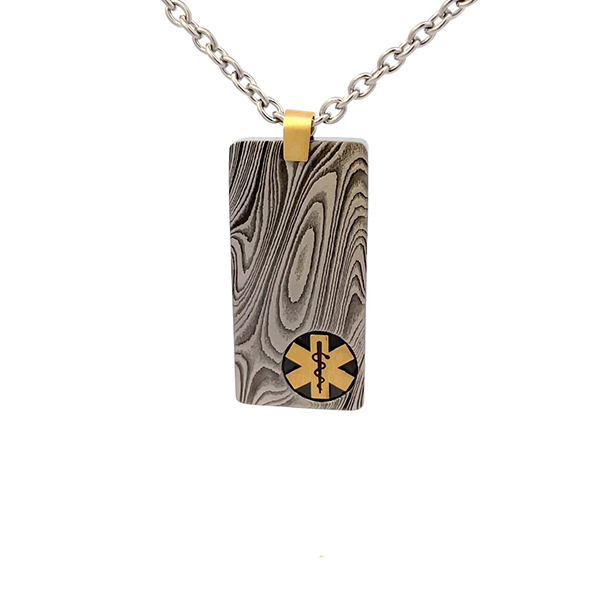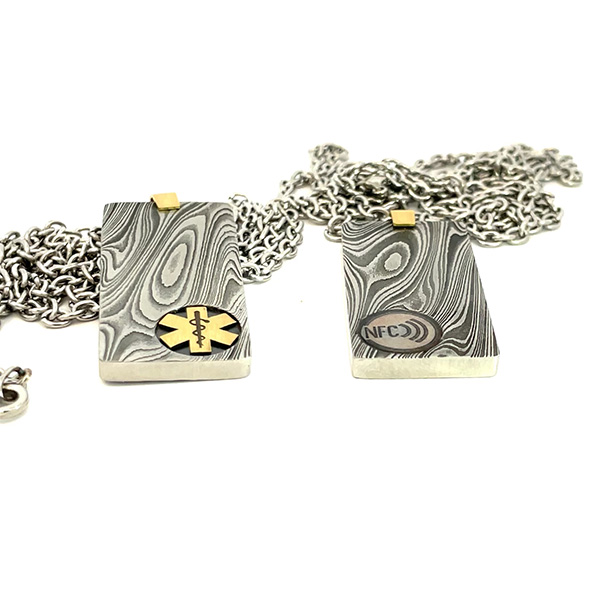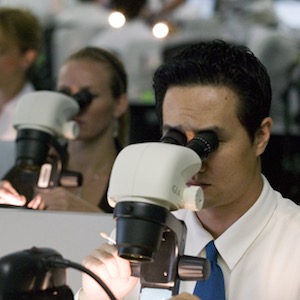
It was the end of the 2022 JCK Las Vegas show when the designer Chris Ploof found his way to the Tech & Essentials neighborhood on Level 1 of the Venetian Expo to check out EZEC (Easy Emergency Contact), a new Denver-based healthcare technology company showing its medical ID technology for the first time.
Ploof had promised his friend, the industry veteran Manos Phoundoulakis, a cofounder of EZEC, that he would swing by.
“When I finally made it down to his booth, it blew me away,” Ploof tells JCK. “You can finally make medical tags that don’t look ugly. I was immediately on board.”
Exactly one year later, at JCK 2023, Ploof exhibited the fruits of his partnership with EZEC: a series of dog tag–style pendants—in hand-forged Damascus steel and 18k gold—that carry NFC (near-field communication) microchips connected to EZEC’s secure HIPAA-compliant mobile app and database. Once in use, a simple scan of the tags, which retail for $990, gives first responders access to critical lifesaving data, including allergies, medical conditions, emergency contacts, etc.

“I almost felt an obligation to use the product when I saw it in 2022,” Ploof says. “If you can save one life or help one person by using this product in your jewelry, it’s kind of criminal not to do it. Plus, most medical identification tags are ugly. This is an opportunity to make something nice.”
Ploof bought EZEC’s first batch of NFC chips, which cost $30 each and are sold in groups of 10, and used JCK as a platform to demonstrate the technology, which he intends to expand to unisex cuff bracelets and other pendant designs. (Like all medical ID tags, Ploof’s EZEC tags display the “Star of Life” symbol synonymous with emergency medical care around the world.)
“The scan that Chris was demonstrating is what we call our public or ‘good samaritan’ scan,” says Phoundoulakis. “There’s a full software suite on the back end. An owner can choose to have their info public, confidential, or private. What public means is that anyone with a phone can scan your tag and see the info you want to share in the public space. In confidential mode, you can hide things you only want medical personnel to know about your condition.
“The last option is private,” he adds. “For example, I take a mushroom supplement for memory. It’s irrelevant for a medical response, but I want to keep track of my dosage because I might forget. This is a place to keep all my medical records in one spot, things important for me to remember.”
Phoundoulakis emphasized that in addition to providing essential medical information to first responders, EZEC goes one step further: Once a chip has been scanned, the company also sends an SMS message to all the emergency contacts named by its owner.
EZEC is currently onboarding new designers to help spread the word about its lifesaving technology, which can be used with many types of jewelry, including pendants and bracelets.
“All emergency medical technicians can use their NFC-capable devices to search for medical ID jewelry at the throat, chest, and wrist,” Phoundoulakis says.
As the technology becomes more robust, he and Ploof envision jewelry with NFC chips being used in a variety of ways, from making it easier to check in at medical facilities and/ or streamline identification processes for patients suffering from amnesia, dementia, or shock.
“This is a nice piece of medical ID that can keep people connected to their emergency contacts,” Phoundoulakis says.
But, he adds, there’s style here, too. “There is no medical ID company out there to help you express your individuality. If you like Damascus steel, you’ll love the tags by Chris Ploof.”
Top: Medical ID pendant with EZEC technology in Damascus steel and 18k gold, $990; Chris Ploof
- Subscribe to the JCK News Daily
- Subscribe to the JCK Special Report
- Follow JCK on Instagram: @jckmagazine
- Follow JCK on X: @jckmagazine
- Follow JCK on Facebook: @jckmagazine







